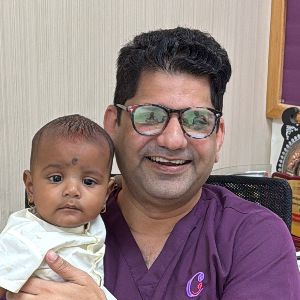1.Are gynecologists of Doc India easily available?
The gynecologists of Doc India are available for any kind of treatment related to gynecological problems as they are highly experienced and qualified in this field and thus can help you in faster and easier recovery.
2.What is the use of hysterectomy?
Hysterectomy is a gynecological procedure that involves the removal of the uterus and the cervix. In some cases, hysterectomy might also include the removal of other parts surrounding the uterus such as the Fallopian tubes, ovaries, and so on.
3.What are the symptoms of endometriosis treated by gynecologists?
Some of the major symptoms of endometriosis that are treated by gynaecologists include the following:
Painful menstrual cycles and menstrual cramps
Pain during sexual intercourse
Heavy bleeding during periods
Painful bowel movements
Abdominal pain or back pain during your periods.
4.When is C-section necessary?
A Caesarean or a C-section surgery is a procedure of childbirth that becomes necessary in the following cases:
There are complications in pregnancy and labor
When the mother is carrying twins, triplets, or more babies
High-risk pregnancies
When normal delivery becomes risky.
5.What are the side effects of vaginal childbirth?
The most common side effects that new mothers face after vaginal childbirth include the following:
Chances of haemorrhage or excessive bleeding
Vaginal bleeding or chances of tear
Irregular heart rate of the fetus
Failure of the labor progress.
6.Should you consult a gynecologist if you have irregular menstrual cycles?
If you feel that you are having irregular menstrual cycles, you must consult a gynecologist to identify if there is any underlying health issue that is causing such irregularities and thus treat those conditions accordingly.
7.What tests do gynecologists advise for PCOS?
If you have the symptoms of Polycystic Ovary Syndrome or PCOS, your gynecologist might advise you the following tests:
Pelvic tests
Blood pressure and glucose levels
Screening for depression and anxiety
Screening for obstructive sleep apnea
Ultrasound of ovaries and uterus
Blood tests.
8.What are the signs of low estrogen in the body?
The following are the signs that you have low estrogen levels in your body:
Excessive fatigue and exhaustion
Low libido
Unnecessary weight gain
Sleeping problems or insomnia
Depression
Vaginal dryness
Hot flashes and night sweats.
9.What do gynecologists advise during the first trimester of pregnancy?
Some of the most common suggestions that gynecologists provide to new mothers during the first trimester of their pregnancies include:
Exercising regularly
Having a healthy diet rich in nutrients
Drink plenty of water
Take enough calories.
10.Can gynecologists help with IVF procedures?
Couples who find it difficult to conceive can consult a gynecologist to undergo the process of In-Vitro Fertilization or IVF, an assisted reproductive process to develop an embryo easily.
Top 10 Dentist in Bangalore | Top 10 Physiotherapist in Bangalore | Top 10 General Physician in Bangalore | Top 10 Endocrinologist in Bangalore | Top 10 Neurologist in Bangalore | Top 10 Gastroenterologist in Bangalore
Frequently Asked Questions
News Articles

Your Ultimate Pregnancy Guide 5 to 8 Wee ...Read More

Your Ultimate Guide for 31st to 34th Wee ...Read More

Your Ultimate Guide For 26th to 30th Wee ...Read More

Your Guide to Deal with Labor Pain Durin ...Read More

Yoga Poses For Third Trimester Pregnancy ...Read More





